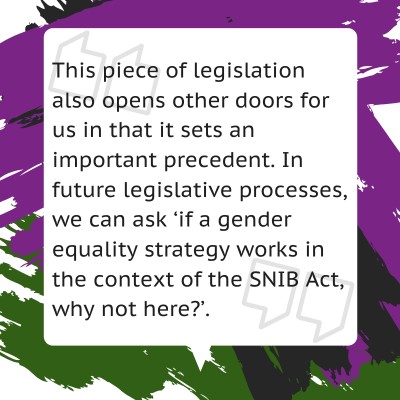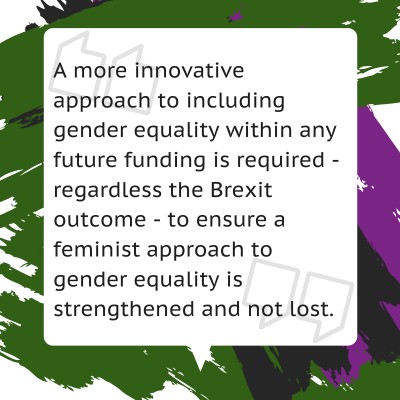Engender blog
GUEST POST: New legislation puts gender equality at the heart of the Scottish National Investment Bank

Last week, the Scottish National Investment Bank Bill was passed at Holyrood, and we were delighted to see the culmination of work by ourselves and Close the Gap in securing amendments which integrate women's equality into the Bill. Today we have a guest blog from Ruth Boyle, Policy and Parliamentary Manager at Close the Gap, celebrating success in gendering the Bill and exploring the process of building gender equality into a piece of legislation.
Facilitating changes in policy can be a slow process, and it’s often very difficult to measure your impact and success. So, when your advocacy has a clear and tangible impact, we don’t think it should pass without note!
Over the past few months, Close the Gap has been working closely with Engender to promote the importance of building gender equality into the design of the Scottish National Investment Bank (SNIB).
Traditionally, economic development agencies have not incorporated women’s specific needs and have not prioritised women’s equality. Consequently, the gender pay gap remains at 13%, and if numbers of women-led businesses in Scotland increased to equal those of men, it would lead to a 5% increase in GDP, equivalent to £7.6bn. We thought the SNIB Bill was a chance to do things differently.
GUEST POST: Four days? For whom?
In this guest blog, Ellie Hutchinson highlights the unseen work done by women in Scotland, and what this means for the calls to more flexible working practices. You can follow Ellie over on Twitter for feminist chat, to find out about her work with the Empower Project and Canongate Youth, and the occasional CBeebies review.
4 day working weeks, flexible working practices and increased childcare is all the [work] rage. With increasing research into the benefits of a 4 day working week, tech-bros disrupting work all over the shop, and manifestos exploring ways to rework work, we might finally be moving to a place where we understand that paid employment is not the be all and end all of our lives. Welcome to the revolution sisters!
But to quote the great Destiny’s Child: "Question."
Who, what, how?
GUEST POST: WHT the ****
During this 16 Days of Activism On Violence Against Women - and with high profile #metoo stories appearing in the courts and the media - we continue to hear stories of harassment and abuse of women and girls. This guest post, from an author who wishes to remain anonymous, explores the issues of power, privilege, and 'wandering hand trouble'.
-400.png) Back when I was a young woman, when it
was described as ‘wandering hand trouble’ (WHT) for short, we were
taught that sexual assault and harassment were just what happened.
Back when I was a young woman, when it
was described as ‘wandering hand trouble’ (WHT) for short, we were
taught that sexual assault and harassment were just what happened.
It would happen more if you were to pluck your eyebrows, wear a choker, or hoik your skirt up above your knees. If you wore American Tan 60 denier tights, you was ‘asking for it’. We didn’t really know what we were supposed to be asking for, especially when we wore knee-length cotton socks on top of the tights.
It was just another of the great mysteries when my mother would say, ‘don’t let your father see you wearing that,’ and which made me feel funny inside because I didn’t know why not.
GUEST POST: When childcare isn’t affordable, we all pay for it
-400.png)
Katie Dickerson is a New Yorker raising two strong little girls in Glasgow. She is passionate about advocating for the rights of working mothers. You can follow her on Twitter @Katie_Popple for jokes about parenting small children and rants about gender equality.
Here she blogs for Engender about why childcare costs are still a major barrier to women's equality.
I’ll admit it - when I decided to have a second child, I didn’t crunch the numbers first.
I thought about how nice it would be for my older daughter to have a sibling, and how complete my family would feel once there were four of us in it. I was so wrapped up in the warm fuzziness of it all that I didn’t consider how expensive this new kid would be.
My oldest had been attending nursery four days a week, so I was used to eye-wateringly high childcare bills. But it was only when I calculated the childcare costs for two children under five that it really hit me - nursery fees could financially ruin my family.
GUEST POST: Brexit - a risk to women's equality, or an opportunity to reshape gender mainstreaming in economic development?
In the week which has seen a further Brexit extension, we host a guest blog from Leanne Wilson, PhD Candidate at the WiSE Research Centre for Economic Justice at Glasgow Caledonian University. Leanne is feminist economist researching the effectiveness of gender mainstreaming as a strategy for advancing gender equality, specifically within the European Structural and Investment Funds and economic development policies in Scotland. You can find Leanne over on Twitter @LeanneWilson82

'Gender mainstreaming' has been an integral strategy for gender equality within the European Structural Investment Funds (ESIF) since the 2000-2006 funding period. Therefore, with Brexit looming and the risk of losing the strategy in economic development policies there is an urgency to assess its effectiveness. Gender mainstreaming was endorsed by the 1995 Fourth World Conference on Women and has continued to be the strategy of the EU in many of their policies. The UN define gender mainstreaming as “the (re)organisation, improvement, development and evaluation of policy processes, so that gender equality perspective is incorporated in all policies at all levels and at all stages, by actors normally involved in policy-making”.
It is contested as a strategy as it has been widely debated by feminist researchers for its ability to transform structural inequalities. It is argued that it involves two different structures, ‘gender equality’ and the ‘mainstream’ which are conflicting, and in some instances competing, frames. However, I fear that leaving the EU will derail any success it has had, and therefore I want to highlight any learning from the experience in Scotland which will ultimately inform successor funding. This blog discusses my early research findings and opinion on the success of the Scottish implementation of gender mainstreaming in economic development polices and, therefore, the implications post-Brexit.
Downloads
 Engender Briefing: Pension Credit Entitlement Changes
From 15 May 2019, new changes will be introduced which will require couples where one partner has reached state pension age and one has not (‘mixed age couples’) to claim universal credit (UC) instead of Pension Credit.
Engender Briefing: Pension Credit Entitlement Changes
From 15 May 2019, new changes will be introduced which will require couples where one partner has reached state pension age and one has not (‘mixed age couples’) to claim universal credit (UC) instead of Pension Credit.
 Engender Parliamentary Briefing: Condemnation of Misogyny, Racism, Harassment and Sexism
Engender welcomes this Scottish Parliament Debate on Condemnation of Misogyny, Racism, Harassment and Sexism and the opportunity to raise awareness of the ways in which women in Scotland’s inequality contributes to gender-based violence.
Engender Parliamentary Briefing: Condemnation of Misogyny, Racism, Harassment and Sexism
Engender welcomes this Scottish Parliament Debate on Condemnation of Misogyny, Racism, Harassment and Sexism and the opportunity to raise awareness of the ways in which women in Scotland’s inequality contributes to gender-based violence.
 Gender Matters in Social Security: Individual Payments of Universal Credit
A paper calling on the Scottish Government to automatically split payments of Universal Credit between couples, once this power is devolved to the Scottish Parliament.
Gender Matters in Social Security: Individual Payments of Universal Credit
A paper calling on the Scottish Government to automatically split payments of Universal Credit between couples, once this power is devolved to the Scottish Parliament.
 Gender Matters Manifesto: Twenty for 2016
This manifesto sets out measures that, with political will, can be taken over the next parliamentary term in pursuit of these goals.
Gender Matters Manifesto: Twenty for 2016
This manifesto sets out measures that, with political will, can be taken over the next parliamentary term in pursuit of these goals.
 Scottish NGO Briefing for UN Special Rapporteur on Violence Against Women
Joint briefing paper for the UN Rapporteur on Violence Against Women.
Scottish NGO Briefing for UN Special Rapporteur on Violence Against Women
Joint briefing paper for the UN Rapporteur on Violence Against Women.

Newsletter
Sign up to receive our newsletter here:
Sign up to our mailing list
Receive key feminist updates direct to your inbox: